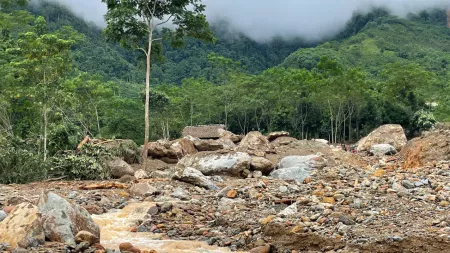Over the past weeks, Typhoon Yagi, Asia's strongest storm in 2024, has ravaged Southeast Asian countries, affecting millions and causing more than 600 casualties. The severe flooding and destruction have overwhelmed vulnerable communities, with women and girls bearing the brunt. Globally women and girls are 14 times more likely than men to die during a climate disaster, and 80% of those displaced by climate change to date are women. Given Southeast Asia’s high vulnerability to natural hazards, it is vital to prioritize the needs and voices of women and girls in recovery efforts to ensure their safety and build resilience against future crises.
Vietnam: Long-Term Recovery in Focus
In Vietnam, Typhoon Yagi - the strongest typhoon in 30 years - has triggered severe flooding, displaced thousands and destroying homes, crops, and critical infrastructure. Women and girls are bearing the brunt, overwhelmed by increased caregiving duties and economic strain.
“Typhoon Yagi has devastated millions, with damage estimated at $2.6 billion and 1.6 million people are affected by the crisis. Our initial need assessment shows significant resource gaps in restoring living conditions in Northern Vietnam, with women bearing the brunt of caregiving, cleanup, and economic pressures. Our team works with the government and partners to coordinate and disseminate relief efforts. We prioritize delivering recovery support to those affected, especially women and girls, and drive long-term recovery efforts that address their unique needs. This includes providing cash, commodities, and resources to meet immediate needs and help communities build resilience in the long run,” said Ramesh Singh, CARE Asia Regional Director.
"We prioritize delivering recovery support to those affected, especially women and girls, and drive long-term recovery efforts that address their unique needs."Ramesh Singh, Asia Regional Director, CARE
Myanmar: A Deepening Humanitarian Crisis
In Myanmar, Typhoon Yagi has intensified an already dire humanitarian crisis, causing widespread destruction with central Myanmar being the hardest hit. CARE is working with partners to provide immediate relief, prioritizing vulnerable groups like women, children, and the elderly.
Over half of Myanmar’s population now lives in poverty, with more than 3 million people internally displaced and 18.6 million in urgent need of aid—52% of these are women and girls. Typhoon Yagi has worsened this crisis, affecting 887,000 people and compounding the challenges faced by women and girls, who are disproportionately affected. Despite their primary caregiving roles, women are often excluded from decision-making and leadership positions, hindering their access to much needed assistance. The floods, which hit at the end of the main rice-growing season, have severely threatened food security and families’ livelihoods. People need the international community to provide urgent support, ensuring access to shelter, hygiene kits, and essential relief supplies and long-term recovery efforts.
Laos: Immediate Relief Efforts
In Laos, CARE is providing immediate relief to 67 villages in Luang Namtha province, where 26,000 people have been impacted. The storm has destroyed homes, flooded farmland, and damaged infrastructure. CARE is working closely with local authorities and community leaders to ensure a coordinated response that addresses immediate needs, especially for women and girls. CARE’s response includes providing clean water, hygiene kits, emergency healthcare, and livelihood restoration, with plans to scale up recovery efforts.
"Our recent studies show that climate change, inequality, gender, and hunger are interconnected, with extreme weather impacting food security for up to five years."Ramesh Singh, Asia Regional Director, CARE
Gender-Focused Climate Solutions in Southeast Asia
Extreme weather events like Typhoon Yagi are not just accelerating the hunger crisis; they are exposing and deepening gender inequalities. “Our recent studies show that climate change, inequality, gender, and hunger are interconnected, with extreme weather impacting food security for up to five years. Women, already more food insecure, are often excluded from disaster planning and rarely asked about their needs. In Southeast Asia, where climate-related disasters are intensifying, prioritizing gender equality in disaster planning and response is crucial for building resilient community,” said Ramesh Singh.
"At COP29, CARE is calling on parties to commit to an ambitious, fit-for-purpose, and responsive climate finance goal that integrates a gender approach to protect the most vulnerable."Ramesh Singh, Asia Regional Director, CARE
“Extreme weather events like Typhoon Yagi are increasing in frequency and severity. At COP29, CARE is calling on parties to commit to an ambitious, fit-for-purpose, and responsive climate finance goal that integrates a gender approach to protect the most vulnerable,” Ramesh Singh concluded.
With a presence across Southeast Asia, CARE is committed to providing life-saving support and driving long-term recovery, focusing on empowering women and helping vulnerable communities rebuild in the wake of Typhoon Yagi.
For media inquiries, contact Sarita Suwannarat, Asia Regional Communications Advisor, email: [email protected]
